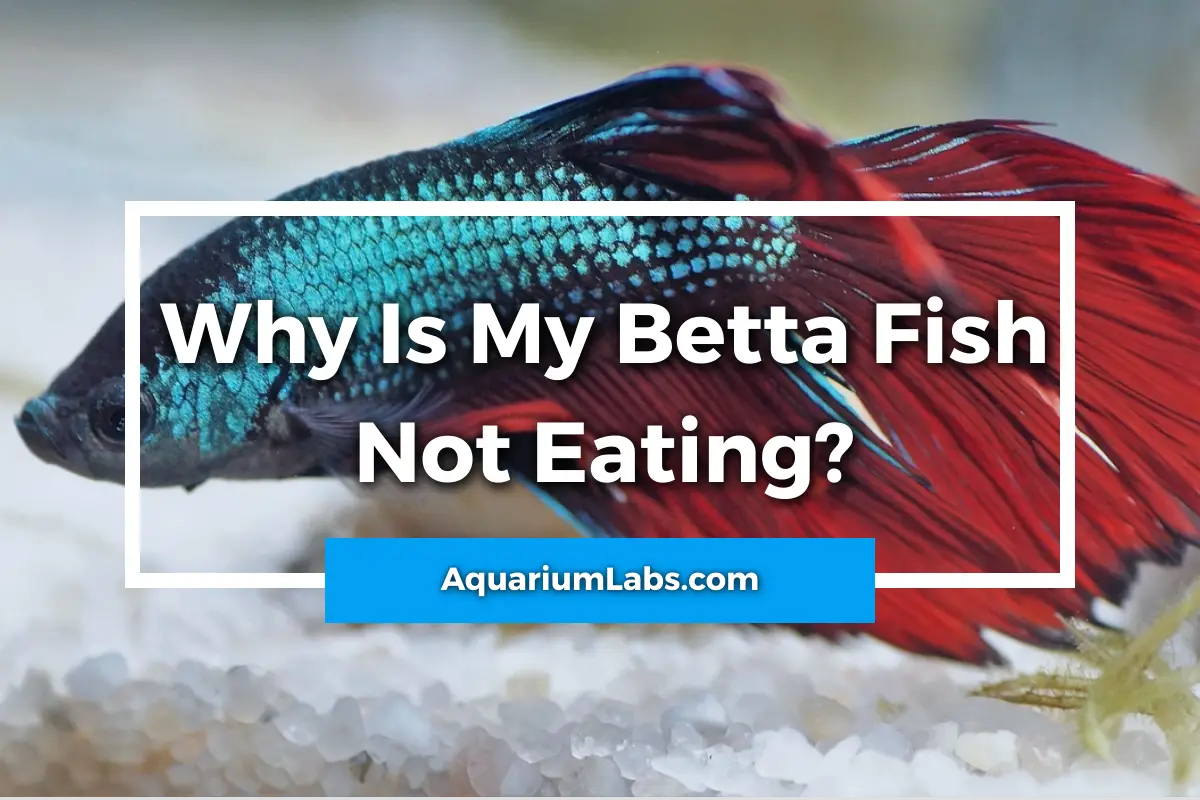While it’s normal for animals to eat less on occasion sometimes, you may see your betta fish not eating like normal ones. If this goes on for longer than a single meal, then it’s time to consider what the issue is. Sometimes it’s as simple as performing a water change or offering something new and exciting.
But sometimes, it is a sign of something more serious. If your betta fish won’t eat, then let’s discuss some common reasons why his eating habits are disrupted and how to get him feeding normally!
New Betta Fish
Did you just get your new fish home only to find he isn’t interested in eating food? If so, then you may not have too much to worry about. Moving from pet stores to your car for the shaky, dark ride home and then being shifted to a new aquarium with different water parameters is a stressful journey for any fish.
There is so much going on in terms of vibrations, water temperature changes, water quality shifts, and even tank mates that the betta fish may simply need time to adjust. A new betta fish not eating is perfectly normal. And generally, betta fish eat reliably once fully acclimated to their new home, which may take as long as a day. But usually, 4 to 6 hours are all that’s needed before your betta fish is ready to sample the fish food on offer!
Bettas and Poor Water Quality
But what if you have a betta fish that has been established in his home for longer than a few days and is refusing to eat food? One of the most common reasons why betta fish stop eating is because the water conditions are poor quality in some way.
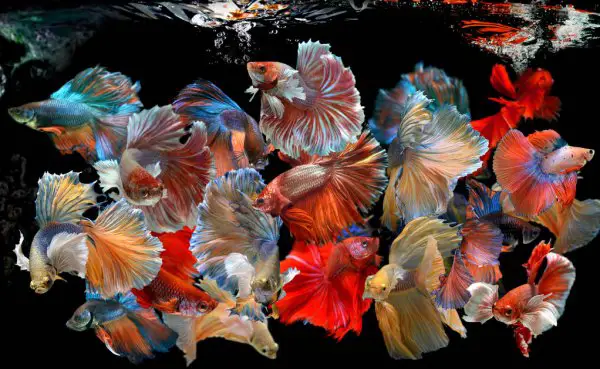
Since we often keep betta fish in a smaller fish tank, it does not take very long for ammonia, nitrite, nitrate, and other noxious chemicals to build up stressful or even dangerous levels. Most betta owners usually are diligent about keeping up with filter maintenance and water changes. But all it takes is a single lapse for water parameters to turn foul. And once this happens, betta fish become lethargic, with clamped fins and a loss of interest in any kind of food.
I recommend always keeping a test kit on hand for your aquarium water. Ammonia is the most important parameter to monitor because high ammonia levels are immediately stressful and even fatal. Fortunately, poor water quality is also easy to fix! A medium to large water change of 40-60% to flush out the poisons and bring fresh tank water in will undoubtedly cause your betta fish to perk up and start looking for food!
Bettas are Tropical Fish
Betta fish are so popular because they are tremendously hardy and can survive in a wide range of conditions. Temperatures from 65-85°F are where they are usually kept; from cold water up to warm, tropical conditions.
But the word to note here is “survive” rather than thrive. In their native country of Thailand, bettas rarely experience water temperatures below 70°F for very long. And when temperatures do get colder, betta fish won’t eat as they are trying to conserve energy.
So an easy fix is to find a heater matched in size for the betta’s tank. Be careful because buying a heater that is too large can cause the water to get dangerously warm and even scald a fish that comes into contact with it. Once your betta tank warms up to around 75-82°F, you will see a marked increase in activity as well as new interest in eating pellets and other usual fares!
Bettas and Other Fish
This may not be your first consideration since many, if not most; betta fish owners keep their bettas alone. People think betta fish are “too aggressive” and need to be separated. When in fact, it’s only male betta fish that need to be separated – and only from each other.
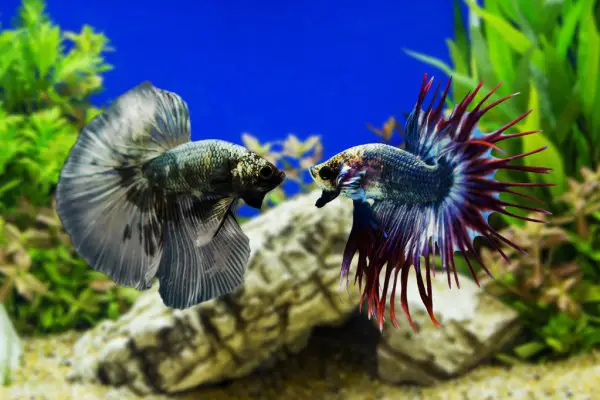
However, if you do keep your betta fish with tank mates, it’s possible that one of them is causing him some stress. The long, flowing fins of male bettas are sometimes tempting targets for fin nipping fish. And it doesn’t take much harassment for a betta to lose interest in food and start hiding from the bully or bullies.
Common fin nipping fish include danios, barbs (especially Tiger Barbs), and larger tetras. If you only have one of any of these fish, fin nipping is even more likely. Because when fin nippers are kept in groups, they tend to focus all of their attention on one another, leaving long-finned fish alone. So take some time to examine how your betta male moves about the tank and see if he is being harassed.
Is He a Picky Eater?
Generally speaking, being willing to eat too much food is a more common issue for betta fish! Pellets, flakes, frozen foods, freeze-dried food, live food… It’s all good, for the most part! But maybe you have a picky eater – or for whatever reason, he is tired of the same old food you need to make an adjustment to the betta’s diet.
So let’s consider some alternatives to what you’re currently offering for a more balanced diet. Most betta keepers offer pellet food of some sort. Betta pellets are excellent because they aren’t as messy as flakes and provide nutrition in a condensed form. And most bettas are used to them and eat pellets readily. But they may take time to absorb water long enough to be palatable for a picky eater.
Live and Frozen Food
One of the best ways to get a picky eater to relent is to try offering them either live foods or frozen food. These two types are some of the best food blends to keep on hand because they are nearly identical to what a betta fish would normally eat in the wild.
Bettas are carnivorous fish, feeding on aquatic insects, insect larvae like mosquito larvae, crustaceans like shrimp, and even fish fry. But prepared blends, while more convenient, are ultimately cheap food because they often contain loads of starch and vegetable fillers that don’t offer any nutritional value and affect the taste.

Live food is great to offer a picky eater. The smell and motion of fresh, living prey are precisely what a bored carnivore needs to give up his fasting. Most aquarium stores carry common live foods include brine shrimp, daphnia, blood worms, blackworms, and tubifex worms. Just be careful when feeding blackworms and tubifex worms because they are particularly high in fat. Large amounts of fat are no better for a betta fish than they are for us. And bettas are known to become so addicted to them that they start refusing pellets and flakes – so offer live worms sparingly.
Betta fish-fed live foods also display better colors thanks to the carotenoids and xanthin pigments found in invertebrates, particularly live brine shrimp, bloodworms, and other bright red and orange or yellow critters.
Freeze-dried foods are some of my least favorite offerings since the freeze-drying process removes some of the nutritional content compared to frozen food. But for many people, it is much more convenient to keep dried foods on hand rather than taking up freezers space. And you still provide nutrients missing in dry food as well as valuable roughage from invertebrate exoskeletons that help betta fish properly digest!
Bettas and New Food
New bettas can also be picky eaters if they are used to a formula that has suddenly shifted once you’ve brought him home. Likewise, if you have a well-established betta fish, yet you’ve decided to shift to a new food source. He may be put off by the shape, taste, consistency, or some other factor, even if it’s better food for him!
Fortunately, hunger is always a good motivator when shifting betta food blends! If he won’t try eating new food, then try offering it again at a later date. Remove any uneaten food from the water column since it will rise ammonia and bacteria if it is allowed to rot. Even if a betta fish refuses to eat for a few days, he isn’t in any danger of starvation. So assuming there are no actual problems to address, try waiting him out to see if he will finally eat the new food on offer!
Signs of Stress and Disease
A betta fish not eating his favorite food may be suffering from stress and/or disease. Since this category is so broad, it’s worth diving into common signs of stress and accompanying diseases to watch out for.
Signs of Stress in Aquarium Fish
Most aquarium fish show the same signs of stress, including bettas. The most common signs include closed-up (clamped) fins, excess mucus, a loss of energy, constant hiding, hanging near the bottom or surface of the tank, and of course, a stressed fish is not eating. A stressed-out or sick fish may not display all of these symptoms, but he will likely show at least a few of them.
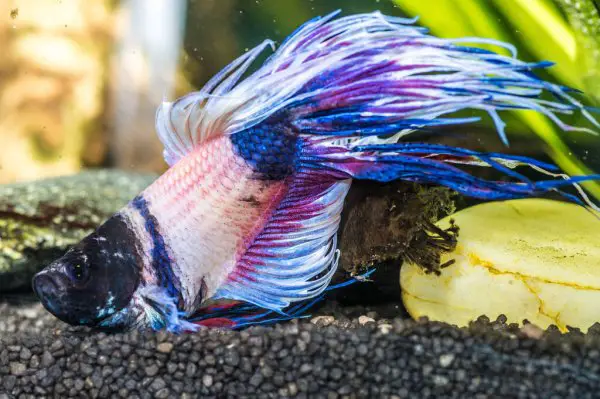
Common Betta Fish Diseases
One of the most common betta fish diseases is ich. Ich is a parasitic infection caused by a small crustacean that affects many fish. Bettas with ich will stop eating and look as if they have been lightly dusted in salt. The tiny white spores eventually burst, releasing ich spores into the water that go to infect other fish. Ich can be treated with copper-based antiparasitic infections.
Swim bladder disease is another common issue that arises with poor water quality. Swim bladders are prone to bacterial infections in dirty conditions and are often fatal if left untreated. You will need to perform regular water changes and treat your betta with an antibiotic like Melafix.
Fin rot and body fungus are also, unfortunately, very common reasons why you see a hunger strike. These can be bacterial or fungal in nature; bacterial infections usually result in excess mucus and inflamed red veins. Fungal infections look like cottony patches and usually show up on or around injuries. You need to know which you have since medications only work on one but not usually the other. Bettas with mouth fungus will also avoid eating to keep from causing themselves pain.
A Full Betta is a Happy Betta
what if there isn’t any problem at all? What if your betta fish home is clean, the water temperature is warm, and your betta has eaten in the past 24 hours? Perhaps there isn’t an issue to be concerned about. Betta fish get full just like any other animal and go through cycles in their appetites and desires. Other signs of contentment include seeing him working on a bubble nest or having several bubble nests built in anticipation of a mate!
Perhaps your fish not eating simply means that he’s content with his surroundings for the moment but will start eating again at his next meal. However, I would still consider testing your water parameters if your fish is not eating longer than two meals since bettas are usually little pigs and never refuse food! And don’t forget to remove uneaten food as before, to keep water conditions as healthy as possible!
Have an Expert Check Up on Your Betta Fish
If you’ve exhausted the reasons why your betta fish is not eating, then perhaps it is time to take him in to see an expert. That expert might be a veterinarian, or it could be a knowledgeable employee at your local pet store! I recommend also bringing a sample of your aquarium water for them to perform tests on. But keep the water sample separate because your betta will expel ammonia into the bag during travel, which will result in higher than normal readings if tested.
An expert may also be able to identify an issue with the betta’s environment that you are unaware of by asking you about the size of your aquarium, how often your betta eats, whether you offer a varied diet and other conditions.
Conclusion
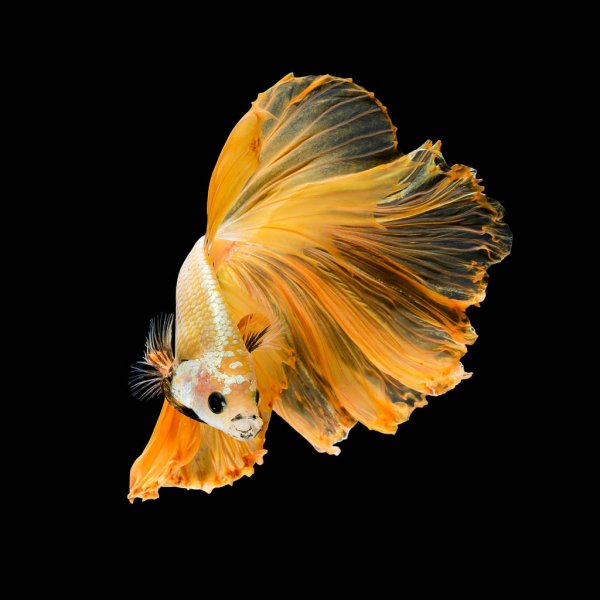
Betta fish not eating may simply be content and not hungry at the moment. But a loss of appetite is also the most common response to stress or disease. Therefore, responsible betta keepers should always take this sign seriously and consider each of the above factors in response to the issue!
Related:
- Can You Feed Fish Rice?
- Do Bettas Eat Snails?
- Can I Feed My Betta Fish Goldfish Food?
- How Long Can Bettas Go Without Eating?

